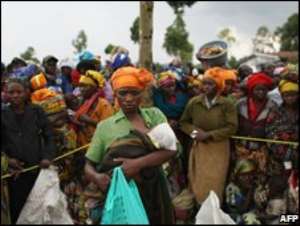
Rebels in the Democratic Republic of Congo have withdrawn, as promised, from some of their positions in the east.
Eyewitnesses say the rebels led by Laurent Nkunda have moved back 40km (25 miles) on two fronts north of Goma.
The withdrawal comes after several weeks of fighting, and follows weekend talks with UN envoy Olusegun Obasanjo.
UN Secretary-General Ban Ki-moon welcomed the rebel pull-back and the opening of aid corridors into violence-hit regions.
He called on all sides to observe the cessation of hostilities, a statement from his spokesperson said.
Clashes between the army and the rebel forces of Gen Nkunda in eastern DR Congo have driven an estimated 250,000 people from their homes and created a humanitarian crisis.
Community plea
Forty-four community groups in the region have made an impassioned plea for European troops to be sent to halt atrocities there.
They say they have witnessed scenes never seen in their history, and that UN peacekeepers are powerless.
The BBC's Mark Doyle is in the region and says the groups who signed the letter range from women's organisations to church groups and are the closest thing to the authentic voice of the community.
The letter, addressed to the UN Security Council and international leaders, details how civilians have been summarily executed and corpses line the streets.
"We don't know which saint to pray to; we are condemned to death by all this violence and displacement. We have been abandoned," it says.
At present, the UN mission in DR Congo (Monuc) is made up of 17,000 soldiers and police - the biggest UN force of its kind.
Some in the UN mission say the peacekeepers' rules of engagement make it difficult to take on fighting forces.
Next week, the UN is to consider a French resolution to increase the number of UN troops in the country by 3,000.
After talks with Mr Obasanjo, Gen Nkunda offered on Tuesday to pull his forces back 40km (25 miles) on two fronts below the town of Kanyabayonga, north of the regional capital, Goma, to create a buffer zone for humanitarian aid.
Gen Nkunda said he wanted the UN to police the vacated territory.
The UN confirmed that the renegade general's fighters had withdrawn, but an expected meeting between the rebels, army and UN did not take place.
A rebel spokesman said the rebels felt a meeting was no longer necessary, but the UN is keen for it to go ahead.
Our correspondent says that whatever happens on the front line, the rebels are highly unlikely to compromise on their political objectives or voluntarily weaken their overall military position.
The UN has accused both sides of atrocities.
This week, a military tribunal in Goma sentenced 11 soldiers to life in prison for rape and looting. Another 12 soldiers face court martial in the coming week - one accused of killing a family of six in Goma on 29 October.
Gen Nkunda says he is fighting to protect all minorities, in particular his Tutsi community, from attacks by Rwandan FDLR Hutu rebels who fled to DR Congo after the 1994 genocide.
The Congolese army has been accused of working with the FDLR fighters to exploit eastern DR Congo's rich mineral resources.
The DR Congo government says Gen Nkunda is backed by neighbouring Rwanda - a charge denied by Rwanda's government.




 We’ll protect state wealth from opaque deals – Prof Jane Naana
We’ll protect state wealth from opaque deals – Prof Jane Naana
 Mauritania president says running for second term in June polls
Mauritania president says running for second term in June polls
 I won't ever say I was a mere driver’s mate' — Prof. Opoku-Agyemang
I won't ever say I was a mere driver’s mate' — Prof. Opoku-Agyemang
 2024 polls: 'EC struggling to defend credibility'— Prof. Opoku-Agyemang
2024 polls: 'EC struggling to defend credibility'— Prof. Opoku-Agyemang
 Akufo-Addo gov't's 'greed, unbridled arrogance, unrestrained impunity, sheer dis...
Akufo-Addo gov't's 'greed, unbridled arrogance, unrestrained impunity, sheer dis...
 Election 2024: Ghana needs an urgent reset, a leadership that is inspiring – Ma...
Election 2024: Ghana needs an urgent reset, a leadership that is inspiring – Ma...
 Partner NDC to rollout a future of limitless prospects – Prof Jane Naana Opoku-A...
Partner NDC to rollout a future of limitless prospects – Prof Jane Naana Opoku-A...
 NPP will remain in gov’t till Jesus comes — Diana Asamoah
NPP will remain in gov’t till Jesus comes — Diana Asamoah
 Sunyani Technical University demands apology from former SRC president over sex-...
Sunyani Technical University demands apology from former SRC president over sex-...
 'Dumsor' was resolved by Mahama but ‘incompetent' Akufo-Addo has destroyed the g...
'Dumsor' was resolved by Mahama but ‘incompetent' Akufo-Addo has destroyed the g...
